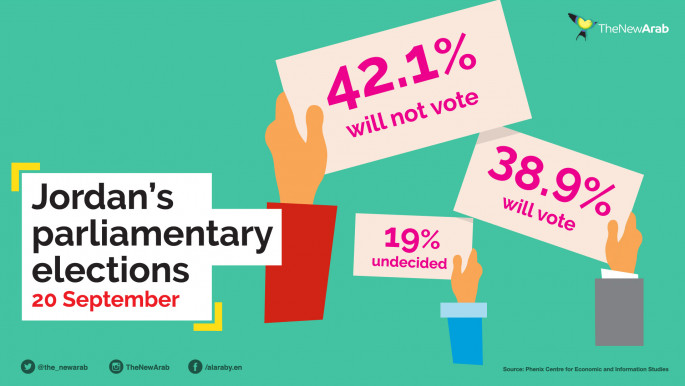Jordan's parliamentary elections: Between old fears and new hopes
While the Jordanian government hopes to see long queues of eager voters forming outside voting booths, cynics will point at previous elections and predict a day marked by many with a disillusioned shrug of the shoulders.
Election-fever does seem to be gearing up in the capital however. Candidate posters and billboards are swamping Amman's streets.
But questions remain over the importance of the election and whether Jordanians will come out in large enough numbers to make Tuesday a turning point in the country's political fortunes.
Will Tuesday's elections open the door for a new age of parliamentary democracy on Jordan's long-touted but long-stunted path to democratisation as optimists in the government's reform programme hope?
Or will it be, as critics and oppositionists claim, yet another rehashed moment of electing a chamber of deputies that will simply stamp decisions already made by the country's monarch?
It is important to bear in mind what is not at stake. These elections will not lead to a major shakeup in the country's power-structure.
No game changer
 |
| [Click to enlarge] |
As has been the case since Jordan's foundation in 1946, power in the Hashemite kingdom resides firmly with the monarch.
King Abdallah, who succeed his father King Hussein in 1999, holds as much centralised power, if not more, than his predecessors.
Prime ministers and governments are appointed and removed at the king's will and all major internal and foreign policy decisions are made in the palace.
Tuesday's elections for representatives in parliament is therefore for an institution that in theory should propose and amend legislation, but one that in the past has usually confirmed decisions already made.
Jordan's parliament itself is made up of a lower chamber, the House of Representatives [Majlis al-Nuwaab], who citizens will be voting for on Tuesday.
But the upper chamber, which needs to pass any proposals made by the lower chamber, all comprises senators appointed by the king.
 |
Jordan's monarchy will want a large turn-out at Tuesday's elections to show the reform process is still 'on-track' |  |
"Both foreign and domestic policy are determined by the appointed government and the state at large," Naseem Tarawnah, editor of the progressive Jordanian blog, The Black Iris, tells The New Arab.
"Now, parliament can influence domestic policy presented to it by the government, but that influence will be determined by who gets elected, how effective parliamentary coalitions are, and the extent of external factors - like the state -affecting MP behaviour."
"MPs traditionally tow the government line at the end of the day, so determining impact on policy will be about whether we end up with a very different lower house that represents significant opposition to state policy."
 |
Jordanians are under no illusion about the power of the new parliament, nor have they been so over past elections |  |
Jordanians are under no illusion about the power of the new parliament, nor have they been so over past elections.
A local pollster reported an expected turnout of 38.9 percent on Tuesday.
Low-turnouts in past election – 56.6 percent in 2013, 54 percent in 2007 and 58 percent in 2003 – have been attributed to disillusionment towards the parliament.
This stems from knowledge that little power actually resides in parliament itself or that candidates, if elected, are either concerned with their own careers or to further the cause of the very narrow regional [or tribal] groups that elected them.
In the tumult and hope inspired by the 2011 Arab Spring revolutions, Jordan embarked on government-led reforms.
Jordan's monarchy will want a large turn-out at Tuesday's elections to show the reform process is still "on-track".
Queues at voting booths will show both Jordanian citizens, and the kingdom's international allies, that the "slowly-slowly" approach to democracy does work in a region racked by instability, dictatorship and war.
The last election in 2013 was also meant to be a turning point, though boycotted by the main Muslim Brotherhood-linked party in protest at what they claimed to be biased voting laws. But while a new parliament was elected, for many Jordanians it was a case of same-old.
 |
The projection of an image of a reforming Jordan is arguably more necessary to be believed by the citizens themselves |  |
The projection of an image of a reforming Jordan is arguably more necessary to be believed by the citizens themselves.
One of the novel features of Tuesday's election has been a particular reaching out by candidates to the youth vote. Both parties and independent candidates have sought to tap into the burgeoning youth and student movement in Jordan.
"There is a desire to emphasise the need for voters – and young voters specifically – to look at candidates from a lens that is relevant to their everyday lives, as opposed to voting along tribal lines or family determinations," Tarawnah told The New Arab.
"Their focus has been economic, which is likely the primary concern of all Jordanians that are economically deprived – be they unemployed, or struggling to make ends meet under the status quo."
"Employment is the big issue for youth, as are salaries, opportunities – especially youth in marginalised communities outside Amman."
Jordan's litany of problems have shown no real signs of abating in previous years. Accusations of corruption are persistent, youth unemployment stubbornly high, the economy languid at best, and instability is an ever-present reality as the country hosts more than a million refugees. Jordan sits bordering Israel, Syria and Iraq, with Islamic State group militants an ever-stalking menace on its borders.
While optimists hope Tuesday's elections will give the chance for political parties to emerge and prosper, cynics maintain that they are just a new way to ensure the status quo remains.







 Follow the Middle East's top stories in English at The New Arab on Google News
Follow the Middle East's top stories in English at The New Arab on Google News


